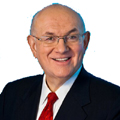Have we ever seen a candidate like Donald Trump before? Not exactly. Trump combines two political traditions: the political outsider and the fringe candidate. We’ve seen each of them before. But not in one candidate.
We’ve seen outsiders with no political experience run against the establishment. They appeal to voters’ disgust with politics and their exasperation with Washington.
Sometimes such feelings lead voters to turn to celebrities like Arnold Schwarzenegger in California or Jesse Ventura in Minnesota. Businessmen like Ross Perot in 1992 can also fill the role of political outsider. They appeal to the belief that government should be run like a business. Perot said he would hire "world-class experts" to look under the hood and fix what’s wrong with the country. And then let the people vote on their solutions in "electronic town halls." Politics would be eliminated.
Trump’s approach is a little like Perot’s. Asked about his policies, Trump responded, "We’re getting the best. I’m going to come out with more positions." Trump will just buy the positions and put them on display. Like Perot did with his infomercials and his flip charts.
Is there a reason why government can’t be run like a business? Sure there is. Business is not a democracy. If business were a democracy, it would look like government.
A lot of voters enjoy watching Trump take on the media and the Republican Party establishment. And beat them at their own game. The latest Reuters-IPSOS poll, taken after last week’s debate, continues to show Trump at the head of the pack.
Didn’t Trump horrify Republicans by threatening to run as an independent if he doesn’t get the nomination? Trump explains that like a true businessman: "My whole life has been leverage, OK? I believe in leverage."
Trump is different from Perot in one crucial respect. Perot had no distinct ideological appeal. Trump does. He appeals strongly to Tea Party conservatives.
That’s the other tradition Trump represents: fringy ideological candidates. They emerge on the far right of the Republican Party (Pat Buchanan, Pat Robertson and Michele Bachmann) and on the far left of the Democratic Party (Jesse Jackson, Howard Dean and now Bernie Sanders).
It sounds far-fetched to describe Trump as an ideologue. The only cause he deeply believes in is himself. His credo: "I’m a smart person" and "I’m really rich."
Consultants write him memos offering political advice. Trump don’t need no stinking memos. "I’ve got to be me," he says. "That’s why I am where I am, leading the polls. It’s not because of memos." Trump’s jobs program? "I will be the greatest jobs president that G0D ever created." If narcissism is an ideology, Trump is its Karl Marx.
Why is Trump so popular with the far right? Because he has chosen to run at an opportune moment. Conservatives are desperate for a champion. The right feels embittered by the Obama presidency and betrayed by the Republican establishment.
The Tea Party sprang up as soon as President Barack Obama entered the White House in 2009. To them, Obama is the most radical left-wing president in this country’s history. They’ve been waiting for a candidate who can express their contempt. That’s exactly what Trump does.
"We have a president who doesn’t have a clue," Trump said in the debate. "I would say that he’s incompetent, but I don’t want to do that because it’s not nice."
Trump also has an issue that galvanizes the far right: immigration. "I will build a great wall," Trump said when he announced his candidacy, "and nobody builds walls better than me."
Conservatives don’t like what’s happening to the country, specifically the emergence of a New America that is more diverse and more inclusive. The right is determined to roll back the changes of the Obama years. Starting with Obamacare, which Trump called "a disaster" and "the big lie."
Conservatives are a resistance movement, and Trump is a resistance leader. His slogan — "Make America great again!" — is a call to arms to restore the Old America. "This country is in big trouble," Trump said in the debate. "We don’t win anymore."
It’s amazing when you think about it. Trump is a multibillionaire running against the establishment. He’s a candidate with no coherent political philosophy running as a conservative champion. It doesn’t make sense. But, so far, it’s working.
That's because he has an unusual coalition behind him. What they share is joy in defiance. And Trump is the Great Defier.
Previously:
• 08/13/15: Govern this, guv: Partisian pols and winners
• 08/11/15: How Trump wins
• 08/03/15: Say It Ain't So, Joe
• 07/22/15: What the latest presidential polls tell us --- hint, it's not who's going to win
• 06/22/15: A Two-Oxymoron Race
• 06/18/15: Losing Our Religion: Not so fast, Dems
• 06/15/15: Rebellion in the Dems' Ranks
• 06/11/15: Divide and Conquer
• 10/22/14: Dems Are Having Trouble With the Working Class, Just Like the 2010 Midterms
Bill Schneider, a leading U.S. political analyst, is a Distinguished Senior Fellow and Resident Scholar at Third Way. Along with his work at Third Way, Bill is the Professor of Public and International Affairs at George Mason University and is a contributor to the AL Jazera English network. Bill was CNN's senior political analyst from 1990 to 2009 and was a member of the CNN political team that was awarded an Emmy for its 2006 election coverage and a Peabody for its 2008 coverage. Schneider has been labeled "the Aristotle of American politics'' by The Boston Globe. Campaigns and Elections Magazine called him "the most consistently intelligent analyst on television.''
Comment by clicking here.



 Contact The Editor
Contact The Editor
 Articles By This Author
Articles By This Author